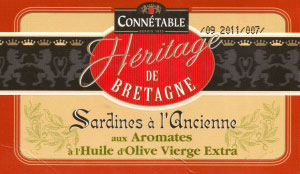A spread of ‘Whales’ fashioned from canned sardines
At the University of Cambridge in 1820 self-chosen men first met as the Converzatione Society. The semisecret society always numbered twelve and so became known as the Apostles. A dozen from the era just preceding the First World War would form the core of Bloomsbury. Among their rituals they ate something called Whales. This version, perhaps of only apocryphal connection to Cambridge, is made from mashed and seasoned sardines. The addition of butter and cream to the sardines transforms their flavor into something both milder and more bracing than the fish alone. Four starters or after-dinner savories or anytime snacks.
 2 135 gram (about 4¾ oz) cans sardines, skinned and boned
2 135 gram (about 4¾ oz) cans sardines, skinned and boned- about 1-1½ Tablespoons unsalted butter
- about a Tablespoon of heavy cream
- a little salt
- a lot of pepper
- 4 slices hot toast
- Dump everything but the toast in a food processer and grind the mix to a paste.
- Divide the whales onto the hot toast and serve.
Notes:
Jan Ondaatje Rolls found the recipe among the Frances Partridge papers at King’s College, Cambridge, and reproduced it in her Bloomsbury Cookbook. Partridge, however, did not call hers a recipe for whales but rather called it simply ‘Sardine Savoury.’ Like much of the Bloomsbury Cookbook, any connection of the recipe to Cambridge is dubious and to Bloomsbury per se tenuous.
Partridge may have taken her recipe from the great Marcel Boulestin, whose cookbooks lined the shelves of several Bloomsbury kitchens. From his Evening Standard Book of Menus:
“Take a tin of sardines, carefully remove the skins and bones and pound well. Add same quantity of butter, salt and pepper. Mix thoroughly so that it becomes a smooth paste. Serve very cold. Quite ordinary sardines will do for this.”
As Elizabeth David notes in a relatively rare nod to English foodways, there is nothing particularly French about sardine butter. Boulestin himself lived most of his life in London, where he operated his famed Covent Garden restaurant for decades and acquired an admiration for English as well as French food. According to David, however, pastes like sardine butter had been “hitherto regarded as sandwich fillings.” Boulestin, she maintains, taught the British that their “family supper savouries were valuable resources which could be differently deployed and offered as party dishes.” (David, An Omelette and a Glass of Wine (New York 1985) 168)
The King’s College website entry on the Apostles states that they ate something simpler, unaltered sardines on toast. That sounds more convincing; at least the beheaded whole fish looks a little like a beached whale and it is doubtful the earnest students bothered much with the preparation of food. (“A Cambridge secret revealed: the Apostles,” www.kings.cam.ac.uk/archive-centre/archive-month/january-2011.html (accessed 16 April 2015) )
Still the savory sardines are good, cheap, sustainable and simple to prepare. Nobody in the United States is likely to have encountered them so take advantage of their obscurity to start the conversation, about Whales, Bloomsbury and British foodways.
The Apostles still exist in expanded form and since the 1970s may include women. “One dose not simply join the Apostles…. A ‘potential’ candidate did not know he was proposed until he was accepted.” (“A Cambridge secret revealed”)

